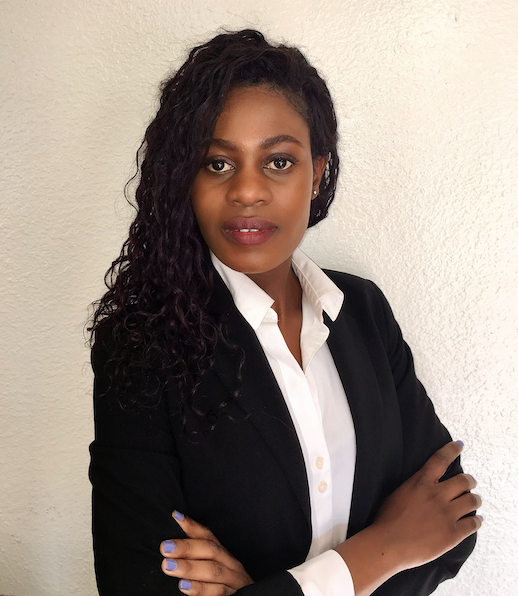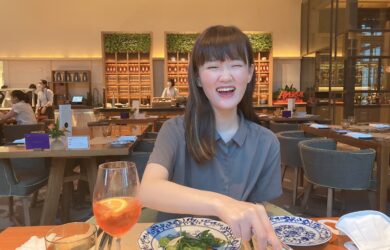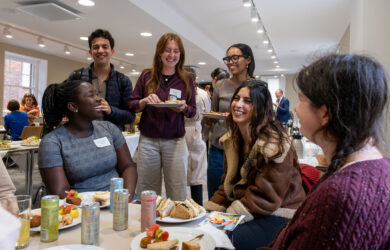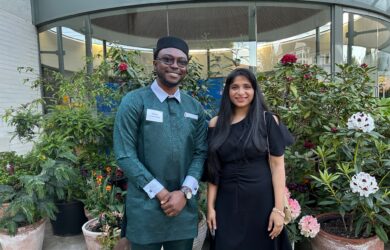
The Gates Cambridge mentoring programme brings alumni and scholars closer together in mutually beneficial ways
Being part of the Gates Cambridge community means having the opportunity to listen and learn from a large family of incredibly diverse, brilliant and kind individuals.
Akhila Denduluri
The Gates Cambridge Scholars Council has been running a mentoring programme since 2018 as part of an effort to bring alumni and scholars closer together, build a stronger sense of community and to give mentors a chance to give back.
This year has seen a big increase in the number of mentors coming forward, with over 50 coming forward.
Ntombizodwa Makuyana [2020, pictured below], Alumni Officer Gates Cambridge Council, says part of the reason is that everyone has been in lockdown and community and social interaction have become more important.
 She has coordinated the Gatesway scheme, matching mentors and mentees and preparing a document to set expectations and ground rules. First, she recruited the mentors and put their details, excluding their names and other identifying information, into a word document for scholars to choose their top five from. Mentoring partners decide how frequently they want to meet.
She has coordinated the Gatesway scheme, matching mentors and mentees and preparing a document to set expectations and ground rules. First, she recruited the mentors and put their details, excluding their names and other identifying information, into a word document for scholars to choose their top five from. Mentoring partners decide how frequently they want to meet.
The scheme began in early June and lasts until September when there will be other initiatives where alumni and scholars can learn from each other.
Ntombizodwa, who is doing a PhD in Biological Science, says having a mentor who has been through the Gates Cambridge experience is very important. “International scholars have been through the same process and understand what we are going through. They have walked the same path,” she says.
So what is a mentor?
Sarah Dry, [2003], now an author and a research associate on the Making Climate History project at the University of Cambridge, describes it as being “about building a relationship that lasts over time, not about a set number of meetings or specific career advice”. She says: “It is about listening to another person, encouraging them to see their strengths, and giving advice about challenges or transitions. My mentor has taught me to trust in my skills and abilities and to put myself forward for things I might not otherwise have.”
Some of the scholars and alumni taking part in the Gates Cambridge programme have been paired with people with similar academic interests – Kathleen Hammond [2011] who did an MPhil in Multidisciplinary Gender Studies and is now an Assistant Professor of Law at Ryerson University, went to the same law school as her mentee David Matyas [2020], who is doing a PhD in Law, before coming to Cambridge and their career paths align. However, others have taken the opportunity to learn from people in other disciplines.
Many mentors speak of the chance to give back. Thandeka Cochrane [2015], who did her PhD in Social Anthropology and is now a Research Associate on the Cartographies of Cancer project at King’s College London, is mentoring Elfadil Osman [2017], who is doing a PhD in Biochemistry.
Thandeka says: “The Gates community was an integral part of my experience at Cambridge. I wrote the majority of my PhD thesis in the Gates room and spent an awful lot of time there. I feel that it is important for me to give back to Gates when I can. I also love working to support younger people – university in general and Cambridge in particular can be very difficult spaces to navigate, and the more help one has to do this, the better. I hope to be able to smooth the ride for other Gates scholars and to support students in standing up for themselves, their needs and their positionalities in the face of a sometimes daunting institutional structure.”
The benefit of mentoring relationships
Many of those taking part in the programme have benefited from mentors in their own careers. Chioma Ngonadi [2015], who did her PhD in Archaeology and is now a lecturer at the University of Nigeria Nsukka, said: “I got to where I am today not only on my abilities but also due to the opportunities provided to me by my mentors. My mentors have contributed significantly to my career growth and have helped me define my career aspirations.”
For Maria Pawlowska [2007], who did a PhD in Earth Sciences and is now a biologist, gender studies lecturer and gender equality expert, it was about giving people the help she would have liked to receive: “I benefited greatly from mentoring in my undergraduate course and suffered from a lack of it in my PhD so I thought I could perhaps help someone out.”
Others speak of a mutual learning process. Sarah Dry says: “The Gates community is full of extraordinary people. As a mentor, I am sure I will gain as much as my mentees from the experience. Learning about what others are studying, the life courses that have led them to where they are today, what their plans are for the future is inspiring and enlivening for me.”
For mentees, the chance to understand how to navigate an increasingly complex world of work is vital. Sarah Hirschfield [2020], who is doing an MPhil in Philosophy, is being mentored by Chandler Robinson [2009], who did an MBA and is now co-founder and CEO of Monopar Therapeutics. She says: “I hope to learn how to navigate an increasingly complex world that presents us with many options. I want to learn how to ask the right questions, notice the right things, and ultimately choose the right path. Chandler is so impressive. He’s navigated difficult avenues in both medicine and business, and I’m excited to learn from him.”
Chandler in turn says that he has benefited from mentors in his career and relishes the chance to help other scholars from what he says is an inspiring community.
Megan Holdt [2018] is doing a PhD in Earth Sciences, and is being mentored by Rob Perrons [2001], who did a PhD in Engineering and is now Professor of Technology Management and Strategy at the Queensland University of Technology in Brisbane. She says: “Career paths are increasingly becoming non-linear, and mentoring is a good way to learn about how others have navigated their career.”
Others have very immediate priorities. Charity Bhebhe [2018], who is doing a PhD in Pharmacology and is being mentored by Nicole Basta [2003] who did an MPhil in Epidemiology and is now Associate Professor in the Department of Epidemiology and Biostatistics at McGill University, said she hopes to expand her network and get guidance on making decisions about post-doctoral opportunities. She adds: “As a Gates scholar, it is inspiring to learn from other scholars who were in the same position as I am a few years ago and have gone on to make an impact in the world in their various careers.”
Some mentees have one mentor, but others have more than one. Akhila Denduluri [2017], who is doing a PhD in Chemistry, is mentored by Sarah Dry and Anke Timmermann [2003], both of whom did their PhD in History and Philosophy of Science as well as Maria Pawlowska. Akhila says she is interested in getting a broad range of insights into career planning and personal growth and work-life balance as well as guidance on strategy and choices. She said: “Being part of the Gates Cambridge community means having the opportunity to listen and learn from a large family of incredibly diverse, brilliant and kind individuals. The mentors and the conversations always leave me with equal parts of gratitude, awe and affection.”
Shared values
Many involved in the programme speak of the sense of community within Gates Cambridge and how a Gates Cambridge mentoring programme could help to build tighter bonds between alumni and scholars. Thandeka Cochrane says the programme is “more intimate and also more concrete than other mentoring programmes” and she likes that it is specific to being a Gates Cambridge scholar. Others talk about the importance of mutual values, particularly the commitment to improving the lives of others, and of an international perspective.
Rob Perrons says simply: “I think that the discussion between and among Gates folks is a bit different than what other mentoring relationships might be able to offer because of the shared background. Those Cambridge years mould and shape you in ways that are hard to put your finger on. Someone else who has been there would understand that in a way that others might not. Also, Gates folks typically share a passion for making the world a better place. So you can wade into the discussion knowing that about the other person’s motivations even before the conversation begins – and that’s no bad thing.”
Anke, who is an independent antiquarian bookseller, hopes the experience will open up possible career paths for scholars. She says: “For scholars in the humanities there are a number of potential careers outside of education and academia that are not necessarily obvious or well-known. My profession as an antiquarian bookseller and writer is one of these: I would not have found my passion for working in the cultural heritage sector had it not been for conversations with informed and friendly librarians and booksellers, some of which happened by chance. As a mentor I can reduce the element of chance and introduce interested scholars to available opportunities in the art and antiques trade and roles in the cultural sector in general, while helping them explore their interests and potential.”
One of her mentees is Olin Moctezuma Burns [2020], who is doing a PhD in History and Philosophy of Science, and she is already benefiting from the results. She says: “My mentor has encouraged me to expand, acquire and improve my abilities, and provided many possible routes to investigate and creative opportunities to follow. I am gaining new understandings of the sectors that I am interested in, learning new practical skills, building my self confidence and familiarising myself with ways through which I could make impactful change.”
*Main picture credit: Image by Gerd Altmann from Pixabay












